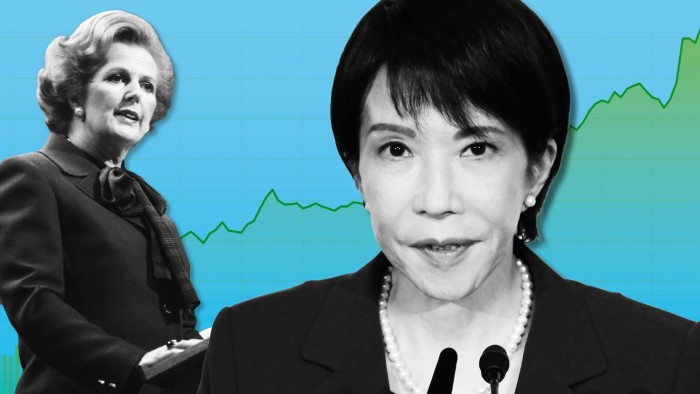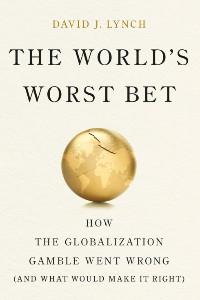
Unlock the Editor’s Digest for free
Roula Khalaf, Editor of the FT, selects her favourite stories in this weekly newsletter.
She once played drums in a heavy metal band and calls herself Japan’s Margaret Thatcher, conjuring up an image of Britain’s first female prime minister that takes time to dislodge.
Sanae Takaichi’s election as leader of the ruling Liberal Democratic Party gave a further boost to a Japanese equity market already up around 40 per cent over the past six months. This is despite the country’s bond market being among the worst-performing — the 10-year JGB yield has risen from 1.1 per cent to nearly 1.7 per cent this year, halving the capital of anyone holding these bonds.
Takaichi, 64, is seen as an heir to her close friend, Shinzo Abe, who served as prime minister between 2012 and 2020 and was assassinated three years ago. They were elected to the House of Representatives together in 1993 and shared a conservative approach to politics.
The Japanese stock market performed rather well during Abe’s reforms, encouraging companies to raise profitability and shareholder returns. Abe also prepared Japan to take greater responsibility for defence and security in the region — a focus for the new prime minister.
Donald Trump is likely to welcome a right-wing regime, especially one that increases defence spending. Defence stocks rose on the election results, but valuations still look unstretched. For instance, Mitsubishi Electric trades on 21 times earnings, and these are expected to grow at more than 10 per cent for the next few years as defence orders come through.
One area where Japanese companies lead the world is robotics and factory automation. Stocks in this area have been depressed as orders from Chinese manufacturers have stalled. Recovery in China should help.
While some sectors in China may have built excess capacity (like electric car manufacturing), others are seeing fresh investment, especially semiconductor manufacturing. Japanese company Yaskawa makes the leading semiconductor robots. Beyond this, new applications for factory automation are developing — such as automating food handling and rice farming and developing new robots that are good at sewing.
Investors in Japan have been tempted in recent years by two opportunities: buying world-class companies on modest valuations or buying slightly obscure local companies at bargain-shop valuations.
Japanese companies have faced activist shareholders buying stakes and pressing for higher shareholder returns. A more nationalist political environment might stymie some of this corporate activism, especially if it is seen as aiming for short-term gains while damaging Japanese commerce.
Recently, however, several Japanese companies have been announcing ambitious plans to raise profitability without being forced into it by activists. Take, for instance, print technology specialist Toppan Holdings. It has been taking considerable profits from reducing its stake in Recruit Holdings and reinvesting the proceeds into capacity to make photomasks for the semiconductor industry.
These masks have the design of the wires you want printed on them. They are placed over the silicon, which is then blasted by laser to burn the design on to the chip. Thus Toppan’s history as a printer has led to the company becoming a world leader in a critical item in modern semiconductor manufacturing.
The business is innovating in other ways, too. One illustration is the development of floor-sensor equipment for older people living alone that raises an alarm if you have been in the bathroom too long and may have had a fall.
The ageing global population is a powerful theme that presents challenges that AI and robotics can help address. This is a gentle tailwind that could be a powerful driver of long-term returns, and Japanese companies such as Toppan, with a culture of technological innovation and a strong competitive advantage, look exciting to me.
The other reaction to Takaichi’s election has been expectation that interest rates will stay low for longer. Don’t count on it. When Abe was prime minister, Japan saw low interest rates and large-scale quantitative easing. Times have changed.
After years of falling prices, Japanese inflation has been holding at more than 2 per cent for the past three years. Phone company NTT raised landline prices recently for the first time in 30 years. Interest rates have been held artificially low, at half a per cent (OK, higher than the zero per cent a year ago), but Japanese pensioners — a core constituency for Takaichi — will have little tolerance for cost-of-living increases.
Mrs Thatcher’s election in 1979 came against a background of inflation. She did not hesitate to raise interest rates, despite this being likely to reduce growth and lift unemployment.
If rates in Japan do go up then financials, a big chunk of the index, could go through the roof. We hold Sumitomo Mitsui Banking Corporation as a hedge. I would expect the yen to strengthen, which will hurt exporters initially but benefit sterling holders of Japanese equities.
It is never healthy for an economy to have equity markets supported by central bank manipulation — it undermines the multiple you get on your earnings. So lifting rates would seem healthy over the longer term, and I am not worried about it. But it will take nerve.
If Thatcher was the Iron Lady, maybe Takaichi will become the Iron Maiden — the heavy rocker unafraid to take tough decisions.
Goshawk funds hold Mitsubishi Electric, Yaskawa Electric, Toppan Holdings and Sumitomo Mitsui Banking Corporation.


